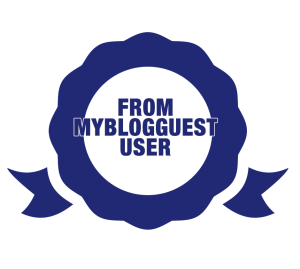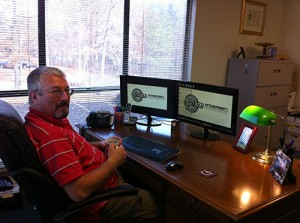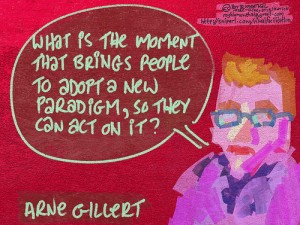 From Ann: Here’s a great and very personal story of one of our members Karl Hindle’s journey into the world of SEO and Internet marketing. This article is courtesy of MyBlogGuest Articles Gallery, the best source of free unique content for your blog – and that’s the great sample of what you can get using it!
From Ann: Here’s a great and very personal story of one of our members Karl Hindle’s journey into the world of SEO and Internet marketing. This article is courtesy of MyBlogGuest Articles Gallery, the best source of free unique content for your blog – and that’s the great sample of what you can get using it!
In 2001 I sold a business I had spent 15 years putting together and building up. It was successful and employed over 20 people, however the time had come to move on, sell up and try something new. After the stress of negotiating and finalizing the sale, it came as a bright relief to have money in the bank and more importantly, my time to do as I pleased – I was specifically prohibited from working for 6 months, and life was good.
 But, after less than 6 weeks of my contractually enforced vacation, I was climbing the walls with boredom!
But, after less than 6 weeks of my contractually enforced vacation, I was climbing the walls with boredom!
I needed something to do and endless rounds of golf and vacations had lost all of their appeal. I desperately needed to work, but at something completely new and that is when I got a call. A friend had problems with creating an annual report for his firm, so I stepped up to the plate, grateful for something constructive to do and even better, I was being paid.
My career as a writer had started.
Entry into the World of SEO
Before my first assignment finished, more arrived and I quickly built a reputation for delivering high quality writing on technical subjects, particularly finance and technology. Amongst those first assignments was one to write the marketing content for a consumer website, and subsequent demands for ever more quickly led me into the online world.
This was a time when SEO was easy, but polluted with the smoke and mirrors approach of practitioners who were here today and gone today too. Throw up some written content stuffed with keywords, usually on a keyword rich domain name and shoot a couple of links at the site and voila!
Instant ranking success in Google!
And with ranking success, I saw website owners making a ton of money and I became very interested. So interested, I started doing the same myself, only I was a writer and could have the content on a brand new site up in the morning and leave time for an early liquid lunch while waiting for it to be indexed.
How SEO Has Changed – and It Has Nothing to Do with Google!
As Google made changes to the search engine, so did SEO techniques, but no matter what changes were made by Matt Cutts and his Webspam team, SEOs managed to keep pace, or at least my firm has. So much so, I have today built a thriving SEO and Internet marketing business which combines my own portfolio of websites with a portfolio of paying clients, eager to benefit from the hordes of consumers using search engines to get their fix.
In the space of a decade, I have transformed myself from writer to web entrepreneur and well-paid SEO consultant.

But now, all this is changing in a much more fundamental manner, and not because of anything Google has been doing.
The fundamental driver for change is because of how people, real users, are accessing, using and interacting with web content (and to be fair, this has been happening for some time now).
The World Wide Web has become polluted with poor websites, bad content and terrible deals. I lay the blame firmly at the door of Google – it is their search engine, so obviously driven by backlinks and responding to the presence of keywords, which set off the rabid capitalization of the web through spam.
If you build it, the capitalists will come – I should know, I am one.
Going after ROI is just human nature.
From Users to Audience to Community
It doesn’t matter who is at fault for all the dross we find online. What matters is recognizing that the world has changed, and Internet users are driving this change. They demand quality, versatility, answers and they want to consume and interact as they see fit, unrestricted by the dictates of either search engines or webmasters, indeed they are not bound by the constraints of technology.
We can see evidence of this evolution of user-driven change by looking at Facebook.
A simple website, born in a college dorm from the bones of an idea to rate how hot college students looked. Today, we all know what it has become, but Mark Zuckerberg is fooling himself if he, or any shareholder, believes Facebook’s success is not solely due to the users.
Without users, websites are nothing.
Still, there is that hangover of the ‘old’ Internet, whose terminology refers to ‘users’ as if they were somehow, unthinking automata in a giant virtual machine ruled by statistical conversion metrics.
Users are people, like you and I – they read, listen, watch, drink, work, love, cry and laugh amongst a million other things.
But old school online marketing focuses on one human activity only – spending money.
Spending money is important for oiling the wheels of online commerce, but it is how we engage real people with our offering which will help them to decide to spend money, and more of it again and again. I’ve seen this with my own sites and with clients, again and again – opportunistic sites can make money, but value is created when you create an engaged community (and that is why Facebook is valued so highly).
The SEO business has to move from a technical approach to a human-based model. Content must engage and encourage interaction, particularly sharing (sharing content is the currency of Social Media and is one reason why SEO’s are taking notice of SM signals).
More than simply engaging people, your content must envelop and captivate them, bringing the audience into your sphere as part of your community or following. I am no longer simply counting total traffic, new visits and page views (these are ‘user’ metrics), but working on building and maintaining a community and audience, based on mutual respect and trust.

Content is Not King and Users Are Not Internet Cattle
My SEO approach is now to work on broadening and developing the audience I can reach, and keeping them engaged. I spend more time and money on writing than ever before, but the volume of the written word has reduced in relative terms. Multimedia is increasingly important, especially video, as is the ability to deliver content over a range of devices, particularly mobile ones.
But this is beyond simple content curation or presentation: SEO is morphing into being about reaching out to the “one person” or “right people” to add to our audience and community. SEO can no longer solely focus on increasing the size of the herd being counted by Google Analytics as it thunders through a website. Clients are no longer paying for this for one thing!
Quality over quantity is the rule.
Engagement over numbers should be a more important measure.
SEO is powerful, and I expect it will continue to be so for my working life, but it is no longer the standalone marketing solution it once was able to be. To generate ROI effectively, it has to be so much more and this means treating people like people and not Internet cattle. In the virtual world, how you interact with people is reflected directly in your content, but it is not the content which is king, it is your audience because they pay the bills.
Without an engaged audience, your online proposition is nothing.
Karl Hindle is CEO of Andersen Hindle Inc., based in Richmond VA though he is a tea-drinking Brit, specially imported into the US by his wife, Patsy, for dog-walking and grass cutting duties.
License: Creative Commons image source
Latest posts by Guest Author (see all)
- How to Make Your Guest Blogging Efforts Relevant - January 14, 2014
- A Guide To Writing Content That Actually Deserves To Rank - November 24, 2013
- The Engaging SEO – A Highly Personal View On SEO, Content And People - November 18, 2013

Don Sturgill
An excellent article, Karl. I appreciate your perspective.
Malhar Barai
Truly believe in the words ‘Quality over Quantity’.
Adding to it, I would say, write for human beings and not for search engines.
If you notice, Google is slowly and steadily building a ecosystem around search – with Google Glass, Driverless Car and each of these interact in human language form.
So going forward, if anyone wants their content to be found, it has to answer the basic needs that are driven by devices.
Adapt or perish!!